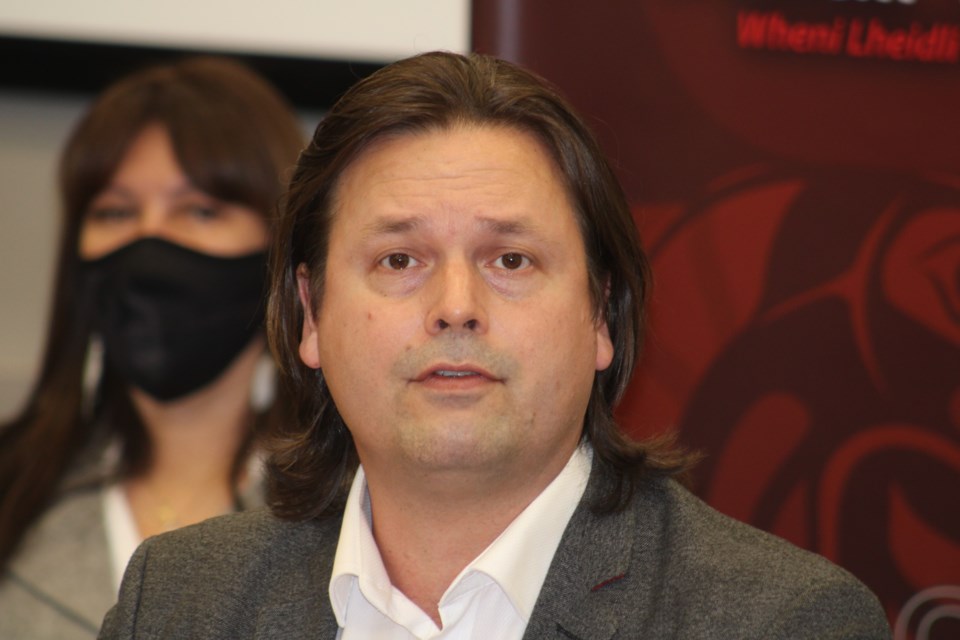The Lheidli T'enneh Nation will press on with its civil action against Enbridge over the October 2018 pipeline explosion that forced an evacuation of the Shelley reserve, saying the company has failed to meet its terms for an out-of-court settlement.
Along with damages, LTN is seeking an order that Enbridge reroute the pipeline away from the reserve and territory.
Band members continue to drive across the pipeline route every day to travel to and from the reserve, LTN Dayih Clay Pountney noted. "I know that our community is extremely scared of moving over this all the time," he said during a media event Thursday at House of Ancestors.
On Oct. 9, 2018, the system's 90-centimetre (36-inch) pipeline ruptured 500-700 metres from the reserve's northern boundary, shooting a massive fireball into the air that could be seen for miles around.
About 100 band members evacuated as the blast shook homes and showered residents with debris. The subsequent fireball kicked out an intense heat and left some to wonder if a low-flying jet was passing by until they saw what had happened.
In February 2019, LTN filed a lawsuit against Enbridge and a bit more than a month later, Enbridge filed a response denying LTN's claims. From there the matter sat until, in spring 2020, Enbridge offered to meet with LTN council. Several meetings followed but no deal.
"We did do some back and forth and in the end it just didn't work," Pountney said. "I still feel like we're treated kind of like they're Goliath and we're David. They just kind of walk in and do as they please and they're used to acting in that manner and that attitude has to change going forward."
In a statement, Enbridge said it is "disappointed the Lheidli T’enneh First Nation has chosen to walk away from negotiations and rejected our offer of bringing in an impartial mediator to help resolve this matter.
"We have made several generous offers to the Lheidli T’enneh First Nation for the Shelley incident over the course of many months of negotiations. However, the Lheidli T’enneh First Nation is looking for a settlement from Enbridge on matters beyond the incident itself and that aren’t in our control or involve other parties.
"Our hope continues to be to reach a settlement and avoid a lengthy legal proceeding. Coming to an amicable resolution rather than a legal proceeding is always far better."
In March 2020, the Transportation Safety Board found delayed inspection and a failure to predict how fast cracks could develop from corrosion were the cause of the explosion. In response, Enbridge said it had completed enhanced inspections to prevent similar incidents from occurring.
On Thursday, Malcolm Macpherson, the lawyer acting on behalf of LTN, cited six incidents involving Enbridge pipelines that have occurred since the explosion, all of them in the United States.
"The Lheidli T'enneh are for obvious reasons, justified in holding the concerns they have about Enbridge," Macpherson said. "Enbridge has not, in the view of the Lheidli T'enneh, demonstrated it can competently deliver hydrocarbons."
Coinciding with the court action, LTN will also wage a "tell the Indigenous neighbours" campaign about their experiences with Enbridge since the explosion. With companies resorting to methods such as looping to increase the volume put through pipelines, Pountney said pressures will increase and lead to bigger explosions if there are mishaps.
"Our neighbours should be worried and it's not just First Nations, it's everybody," Pountney said. "This is in your back yard, this is everywhere."
About 139 kilometres of the pipeline traverses LTN territory and 1.5 kilometres runs through the southwestern corner of the LTN's Fort George No. 2 Indian Reserve.
"Certainly, it would be costly to Enbridge to reroute but pipeline companies have the engineering, have the capability to reroute and they can certainly reroute around 1.5 kilometres of the reserve and that has been requested," Macpherson said.


